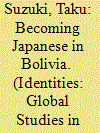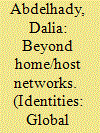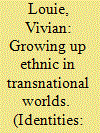|
|
|
Sort Order |
|
|
|
Items / Page
|
|
|
|
|
|
|
| Srl | Item |
| 1 |
ID:
073443


|
|
|
|
|
| Publication |
2006.
|
| Summary/Abstract |
This article chronicles the changing subject-positions of Okinawans in Bolivia from the 1950s to 1990s, who migrated to Colonia Okinawa, an agricultural settlement in the eastern Santa Cruz region, as sponsored migrants backed by the United States military administration and the Okinawan (Ry?ky?) government. Since the forced annexation of Okinawa by Imperial Japan in 1879, Okinawans and the Okinawan Diaspora have often been discriminated against by the Japanese government and the immigrants from mainland Japan as illegitimate Japanese national subjects. The lack of active intervention by the Japanese government and the virtual absence of Japanese mainlanders in the settlement, however, enabled the Okinawan settlers to maintain their Okinawan cultural identities and practices without being questioned about their legitimacy as Japanese. Underscored by their socioeconomic success as large-scale farm owners who employed the locals as inexpensive laborers, the settlers gradually shifted their primary identification from "Okinawan" to "Japanese" in the particular social contexts of Colonia Okinawa. The settlers' concern about their children's cultural assimilation into the local Bolivian population led them to stress the Japanese-Bolivian polarity, while relegating the troubled history between Japan and Okinawa into the background. As a result, Okinawans in Colonia Okinawa, despite their status as formerly colonized subjects under Imperial Japan, "became" Japanese-vis-à-vis local Bolivians-without culturally becoming as one.
|
|
|
|
|
|
|
|
|
|
|
|
|
|
|
|
| 2 |
ID:
073442


|
|
|
|
|
| Publication |
2006.
|
| Summary/Abstract |
This article draws on postcolonial understandings in order to offer a sociological analysis of Lebanese immigrants in Montreal, New York City and Paris. I argue that the concept of diaspora provides a framework for understanding the contradictory aspects of Lebanese immigrant experiences, as some immigrants may undergo a process of assimilation while others continue to hold on to their ethnic identities. Investigating Lebanese immigrant communities as a diaspora leads to the understanding of the ways immigrants construct solidarities that include their homeland, host societies, and the larger diaspora community in various parts of the world. As an analytical framework, "diaspora" incorporates multiple loyalties and attachments that are integral to processes of international migration. Thus, the framework of diaspora promises significant contributions to the understanding of the complex dynamics involved in migration and globalization.
|
|
|
|
|
|
|
|
|
|
|
|
|
|
|
|
| 3 |
ID:
073438


|
|
|
| 4 |
ID:
073440


|
|
|
|
|
| Publication |
2006.
|
| Summary/Abstract |
Transnationalism refers to the phenomenon of immigrants maintaining connections to their country of origin and using a dual frame of reference to evaluate their experiences and outcomes in the country in which they have settled. How does transnationalism matter in the identities among the second generation? This article argues that growing up with parents who want children to participate in their homeland imaginary and in a strong transnational social field does not necessarily mean second-generation Dominicans and Chinese will themselves adopt transnational orientations and/or practices. I find that my Chinese respondents, because of authoritarian parent-child relationships, relative loss of the ethnic language, and scarcity of contact with their parents' countries of origin, viewed themselves as mainly ethnic subjects. Identities for my Chinese respondents involved a generational- and class-specific ethnic identity grounded in the enclaves and perceived rarefaction vis-à-vis mainstream America. My Dominican respondents, because of greater communication within the family, ethnic language maintenance, and the very frequent number of trips they made to the Dominican Republic, drew from both transnational and ethnic orientations, meaning they situated who they were within both national contexts. Although my Dominican respondents acknowledged the differences between Dominicans "back there" and themselves, they spoke cogently on class, gender, and the color line there as well as here. At the same time, their identities were informed by their pan-ethnicity in the United States, namely, how Latinos and Dominicans, in particular, are perceived.
|
|
|
|
|
|
|
|
|
|
|
|
|
|
|
|
| 5 |
ID:
073439


|
|
|
|
|
| Publication |
2006.
|
| Summary/Abstract |
In the growing and varied body of work on transnationalism, questions remain as to the relevance of the symbolic and affective characteristics of transnationalism, its liberating aspects, the ways it is gendered, and the significance of transnationalism in the lives of the second generation. Through the analysis of 40 qualitative in-depth interviews, this article contributes to these questions by examining the transnational practices of first-generation Mexican immigrant women as well as those of the second generation. It argues that although women in this study engaged relatively infrequently in transnational practices, particularly the second generation, the transnational ties that they maintained contributed social and cultural resources that assisted women in navigating their United States-based realities. The article also discusses the gendered dimensions of these practices, including the symbolic ways women of both generations rely on their transnational space to raise their children, the ways transnationalism extends the first generation's caregiving work across borders, and the ways cultural resources available for the construction of women's ethnic identities are gendered. The findings from this study suggest that embeddedness in a transnational social field can have both liberatory and non-liberatory dimensions.
|
|
|
|
|
|
|
|
|
|
|
|
|
|
|
|
| 6 |
ID:
073441


|
|
|
|
|
| Publication |
2006.
|
| Summary/Abstract |
This article offers an exploration of what it means to be "emplaced" amidst the various spatial and temporal streams currently flowing through an emigrant village in the Fuzhou countryside along the southeast coast of China. These flows include both transnational currents resulting from two decades of mass emigration via human smuggling networks to the United States and other foreign destinations as well as national and translocal currents driven in part by Post-Mao reforms for market liberalization and China's "opening up" (kaifang). Particularly, I aim to provide a corrective to the overemphasis of displacement as an experience outside of "home" and moreover, to the mystification of "home" sites as imaginary places simply of longing and belonging. My goal is not to dismiss symbolic understandings of mythical homelands but rather to better contextualize and refine assumptions of migrant displacement in relation to imaginations of locality and belonging from the empirical and phenomenological grounds of those who remained behind. Significantly, approaching issues of migrant identities and social formations from the location of dispersion rather than arrival enabled me to critically examine and situate existing analytic assumptions of displacement (e.g., as migrant nostalgia for "home") alongside local theorizations of emplacement made by those who stayed put as others moved around them. As I will show for my Fuzhounese subjects, the ultimate form of displacement was seen and experienced as the result of immobility, rather than physical departure from a "home."
|
|
|
|
|
|
|
|
|
|
|
|
|
|
|
|
| 7 |
ID:
073444


|
|
|
|
|
|
|
|